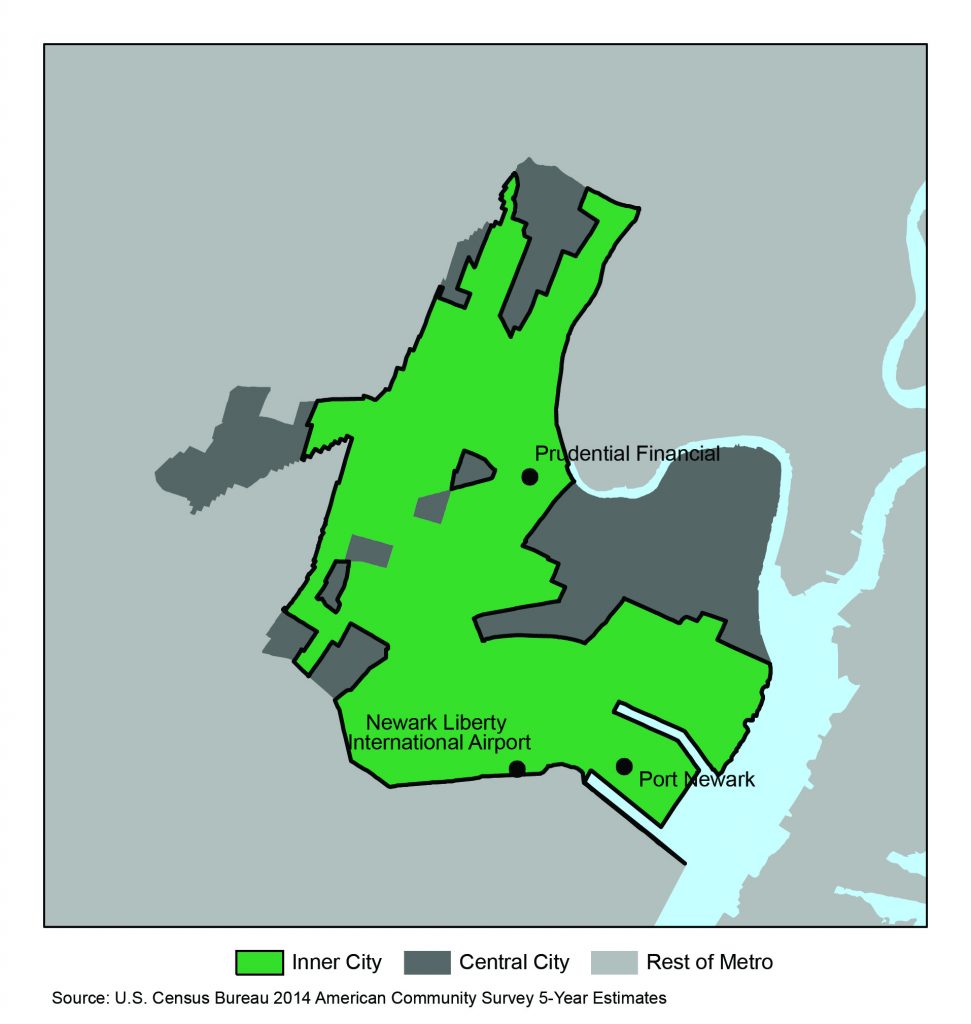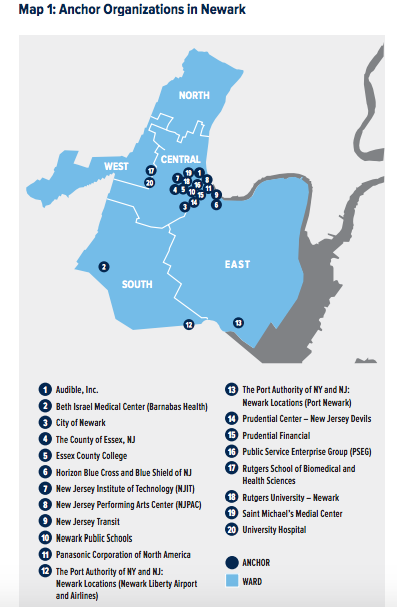Back

Blog
What Does the “Next Newark” Look Like?

Written by Liz Holden and Kim Zeuli
There has been a lot of positive buzz over the last few years about Newark’s “transformation,” prompting Politico to ask in 2015, “Is Newark the next Brooklyn?” Next City’s retort better reflects the aspirations of Newark, “Forget the ‘Next Brooklyn,’ Bring on the Next Newark,” in a story that highlighted unique downtown revitalization projects, including a mixed-use Teachers Village and a Makers Village that includes indoor vertical farming.
Newark, the largest city in New Jersey and the second largest in the New York City metro area, seems to be moving towards Newark 2.0 with numerous high-profile development projects and initiatives in the works. But have these investments improved Newark’s inner city (shown above), where over half (56 percent) of Newark’s population still lives?
According to ICIC’s analysis, during 2009 to 2014, the population living in Newark’s inner city grew by 11 percent. In addition, inner city poverty and unemployment rates increased. The share of people in the inner city living in poverty increased from 33 percent in 2009 to 36 percent in 2014, while the unemployment rate increased from 15 percent to 22 percent over the same period.
More census tracts qualified as “inner city” from 2009 to 2014, meaning that they had higher poverty and unemployment rates in 2014, but two inner city census tracts improved, no longer meeting our inner city criteria. The areas that improved were located in Newark’s Central and South wards, which are primarily residential. The Central ward is proximate to downtown Newark and may be benefiting from Newark’s downtown improvements, while the South ward is located in the southeast corner of Newark.
ICIC is proud to have been engaged as a partner in Newark’s economic development planning over the past decade to address the concentrated poverty and unemployment in its inner city. In 2004, ICIC was engaged by the Newark Alliance, a non-profit organization founded by Newark business leaders to support the broader needs of the Newark community, to develop a market-driven economic development strategy for the city of Newark. ICIC’s strategy was designed to advance Newark’s progress over the previous decade in reducing poverty and unemployment by creating jobs and wealth for Newark’s residents by leveraging the city’s competitive advantages.
Our analysis, Opportunity Newark: Jobs and Community Development for the 21st Century, identified Newark’s strategic location, unmet local retail demand, and several competitive clusters as a foundation for growth for Newark. The clusters included (1) Transportation, Logistics and Distribution Services; (2) Health Services; (3) Education and Knowledge Creation; and (4) Entertainment, Arts and Retail. As reported by Newark Alliance, ICIC’s analysis has led to public policy changes, strategic investments and workforce development programs, including the Workforce Innovation in Regional Economic Development (WIRED) initiative, a partnership of public and private organizations designed to develop a skilled workforce to drive economic growth in northern New Jersey.
More recently, we were engaged by the Prudential Foundation to identify a procurement strategy that would leverage Newark’s numerous strong anchor institutions.

In Creating an Anchored Local Economy in Newark: Recommendations for Implementing a Comprehensive Procurement Strategy, we provide a data-driven implementation playbook for city and anchor leaders. For example, we found that if the six anchors that were the target of our study increased their local purchasing from two to 10 percent, it would mean an additional $33 million would flow to local businesses annually—a significant investment that would create more local jobs.
Local purchasing is not the only way that anchor institutions can shape Newark’s economy. The New Jersey Institute of Technology (NJIT) houses a successful incubator, the Enterprise Development Center, which is New Jersey’s oldest and largest high tech and life sciences business incubator. Founded in 1988 to help commercialize technologies coming out of NJIT, the EDC has two buildings with more than 110,000 square feet of office space and 16 labs.
Our 2015 Inner City 100 winners (the fastest-growing urban businesses in the U.S.) included two companies located in the NJIT incubator—Sabre 88 and Consultants 2 Go—showing the potential impact of this anchor strategy on inner cities.
Audible, an entertainment company that is part of Amazon, moved to Newark in 2007 and believes in Newark’s promising future. Audible’s CEO, Don Katz, is passionate about his company’s connection to the city: “The vision behind the move was to try to combine a missionary, disruptive, technology-driven company with Newark’s transformation. I consider the Newark move one of the best decisions we’ve made as a company.”
In 2015, Audible partnered with Prudential Financial and several other local partners to form Newark Venture Partners, a venture capital fund that will support the growth of innovative technology companies in Newark.
And as we detailed in a blog post last month, the Port Authority of New York and New Jersey recently approved a massive transit expansion project that allocates $2.3 billion for the redevelopment of Newark Liberty Airport’s Terminal A to meet growing flight volumes. The Terminal A reinvestment project is projected to generate thousands of jobs and $3.3 billion in economic activity. The transit expansion project also includes the development of a Midtown Manhattan bus terminal that will improve transit between New York and New Jersey.
As mayor of Newark from 2006 to 2013, now Senator Cory Booker helped to attract high-profile investments and create new public-private partnerships. In 2012, ICIC awarded Booker with the National Inner City Mayoral Leadership Award at our Inner City Economic Summit in Boston. The award honored Booker for his commitment to inner city economic revitalization and his willingness to push the needle to achieve results. Speaking at this Summit, Booker expressed his appreciation that, as he embarked on a career as a Newark City Councilor in the 1990s, ICIC recognized the city’s potential. At a time when Newark was a punch line of talk show hosts’ jokes and residents of neighboring towns were warned to avoid the city at night, Booker said, ICIC shared his vision.
ICIC will continue to support the persistent efforts of Newark’s public and private city leaders to create the Next Newark through innovative partnerships, infrastructure investments, and supporting the growth of its entrepreneurs.
